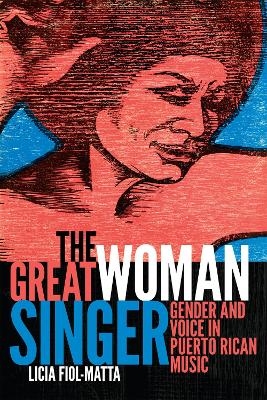
The Great Woman Singer
Gender and Voice in Puerto Rican Music
Seiten
2017
Duke University Press (Verlag)
978-0-8223-6282-1 (ISBN)
Duke University Press (Verlag)
978-0-8223-6282-1 (ISBN)
Using a theoretical framework built on Lacan and Foucault, Licia Fiol-Matta traces the careers of four iconic female Puerto Rican singers to explore how their voices, performance style, physical appearance, and subject matter of their songs challenged social and cultural norms.
Licia Fiol-Matta traces the careers of four iconic Puerto Rican singers—Myrta Silva, Ruth Fernández, Ernestina Reyes, and Lucecita Benítez—to explore how their voices and performance style transform the possibilities for comprehending the figure of the woman singer. Fiol-Matta shows how these musicians, despite seemingly intractable demands to represent gender norms, exercised their artistic and political agency by challenging expectations of how they should look, sound, and act. Fiol-Matta also breaks with conceptualizations of the female pop voice as spontaneous and intuitive, interrogating the notion of "the great woman singer" to deploy her concept of the "thinking voice"—an event of music, voice, and listening that rewrites dominant narratives. Anchored in the work of Lacan, Foucault, and others, Fiol-Matta's theorization of voice and gender in The Great Woman Singer makes accessible the singing voice's conceptual dimensions while revealing a dynamic archive of Puerto Rican and Latin American popular music.
Licia Fiol-Matta traces the careers of four iconic Puerto Rican singers—Myrta Silva, Ruth Fernández, Ernestina Reyes, and Lucecita Benítez—to explore how their voices and performance style transform the possibilities for comprehending the figure of the woman singer. Fiol-Matta shows how these musicians, despite seemingly intractable demands to represent gender norms, exercised their artistic and political agency by challenging expectations of how they should look, sound, and act. Fiol-Matta also breaks with conceptualizations of the female pop voice as spontaneous and intuitive, interrogating the notion of "the great woman singer" to deploy her concept of the "thinking voice"—an event of music, voice, and listening that rewrites dominant narratives. Anchored in the work of Lacan, Foucault, and others, Fiol-Matta's theorization of voice and gender in The Great Woman Singer makes accessible the singing voice's conceptual dimensions while revealing a dynamic archive of Puerto Rican and Latin American popular music.
Licia Fiol-Matta teaches in the Department of Spanish and Portuguese at New York University. She is the author of A Queer Mother for the Nation: The State and Gabriela Mistral.
Acknowledgments ix
Introduction. I Am Nothing 1
1. Getting Off . . . the Nation 16
2. So What If She's Black? 67
3. Techne and the Lady 121
4. The Thinking Voice 172
Epilogue. Nothing Is Something 226
Notes 233
Bibliography 269
Index 279
| Erscheinungsdatum | 18.01.2017 |
|---|---|
| Reihe/Serie | Refiguring American Music |
| Zusatzinfo | 50 illustrations |
| Verlagsort | North Carolina |
| Sprache | englisch |
| Maße | 152 x 229 mm |
| Gewicht | 544 g |
| Themenwelt | Kunst / Musik / Theater ► Musik ► Pop / Rock |
| Sachbuch/Ratgeber ► Geschichte / Politik ► Allgemeines / Lexika | |
| Geisteswissenschaften ► Geschichte ► Regional- / Ländergeschichte | |
| Geschichte ► Teilgebiete der Geschichte ► Kulturgeschichte | |
| Sozialwissenschaften ► Soziologie ► Gender Studies | |
| ISBN-10 | 0-8223-6282-1 / 0822362821 |
| ISBN-13 | 978-0-8223-6282-1 / 9780822362821 |
| Zustand | Neuware |
| Haben Sie eine Frage zum Produkt? |
Mehr entdecken
aus dem Bereich
aus dem Bereich
der stille Abschied vom bäuerlichen Leben in Deutschland
Buch | Hardcover (2023)
C.H.Beck (Verlag)
CHF 32,15
eine Geschichte der Welt in 99 Obsessionen
Buch | Hardcover (2023)
Klett-Cotta (Verlag)
CHF 34,90
Titel, Throne, Traditionen
Buch | Softcover (2023)
C.H.Beck (Verlag)
CHF 27,90


